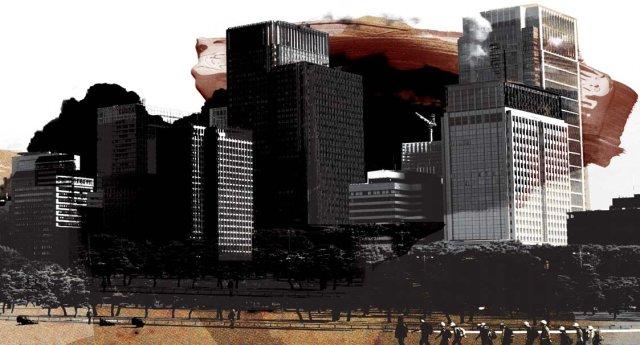Real Estate: Cutting off Dead Wood?

By Anna Kitanaka
With an unprecedented number of real estate companies filing for bankruptcy this year, what does the future hold for the shakiest foundations in Japan?
With the economic forecast looking gloomy, Japan’s financial institutions have tightened up their spending, hauling in the ropes for stricter lending practices and more stringent control. Now, welcome to the demise of the credit-reliant companies.
The foreign banks have also cut back substantially, with orders from headquarters to reduce loan exposure across the board, according to the Financial Times. And one of the hardest hit industries—the real estate sector—is severely suffering. As of the end of July, 60 companies had collapsed—double the number that failed a year earlier, according to corporate credit research company Tokyo Shoko Research Ltd.
US and European banks dominated the real estate sector last year, but now, the industry is facing dried-up bank loans and a pull away from investment. On top of this, Japan’s Financial Supervisory Agency (FSA) initially asked the Japanese banks to also play cautiously, causing domestic financiers to also cut back heavily on their lending capacity.
Facing finance shortages, rising prices of raw materials such as steel, and harsher building- approval regulations, Japan has seen a shocking jump in real estate companies filing for bankruptcy protection. Throw into this mix the implementation of the Financial Futures and Exchange Law (the main aim of which is to strengthen investor protection but in turn has caused lending standards to become stricter) and you get the industry crash that we are seeing today.
A bankrupt industry
July saw a 23.5 percent increase from a year earlier in real estate companies filing for bankruptcy protection. Liabilities at failed real estate companies doubled from July to August, with 438.97 billion yen ($4 billion) of accumulated debt—about half of all liabilities from bankrupt Japanese companies in August.
The number of real estate related bankruptcies is predicted to grow this year, said Takeo Higuchi, chairman of Daiwa House Industry Co., Japan’s second-biggest home builder by market value, in an interview with Bloomberg TV. On June 29, Daiwa cut its first-half earnings forecast by 35 percent after canceling plans for the sale of shares in a real estate investment trust.
Urban Corp., which had grown vastly through the promotion of real estate securitization, became Japan’s largest corporate bankruptcy so far this year. On August 13, the company was forced to file for bankruptcy protection, after struggling with 255.8 billion yen ($2.35 billion) of debt. Two days later, their shares plunged 81 percent, the most since the company listed on the Jasdaq exchange 12 years ago.
“Japan’s real estate market started facing an increasingly tough business environment early this year and we failed to adopt the change,” Urban’s President and CEO Hiroyuki Bozono said at a press conference at the time, citing the credit crunch and the banks’ tough stance on lending since March this year.
No end in sight
Seth Sulkin, President and CEO of Pacifica Malls KK, which oversees 50 billion yen of real estate in Japan, also predicts the negative trend to continue: “I don’t see an end in sight—I think it’ll get much worse.” He believes that at least until 2009, there will not be much prospect for improvement. “It’s so difficult to buy and sell right now,” he said. “We can’t buy as we depend on the banks to give us the loans, and we can’t sell as the buyers can’t get the loans either.”
For real estate developers like Pacifica who rely on large-scale loans to finance growth, a change in acquisition strategy is needed to attract bank loans. “Most of the property we look at must be in central Tokyo (the 5 wards) as outside of Tokyo, it is very difficult to borrow money,” Sulkin said.
Despite the FSA’s reservations prior to the sector’s crash, Financial Services Minister Toshimitsu Motegi said that the government will urge banks, including Mitsubishi UFJ Financial Group Inc. to lend more to small and mid-sized companies— some of the worst affected.
On September 8, the Nikkei reported that seven of the top 10 gainers on the Tokyo Stock Exchange’s first section were emerging real estate firms such as Japan General Estate Co., which led with a 39.6 percent increase. The Nikkei attributes the FSA’s change in stance as helping to appease fears of start-up bankruptcies.
Sulkin disagrees. “I don’t believe that. The FSA are not doing anything to help the situation. They don’t understand the magnitude of the problem and do not have any serious policies in place.” He pointed to an SME hotline the regulator set up to help the smaller companies. “We called that line as a test,” says Sulkin, “they showed no signs of really understanding the problem.”
Hidetoshi Ono, Managing Director of ING Real Estate Japan, holds a more positive view. He believes that the industry in Japan is now going through an “adjustment period,” after the property boom last year which was “inflated over a reasonable and logical price, fueled by high-leveraged players who were taking advantage of the low-interest costs in Japan.” He doesn’t anticipate a free-fall in prices and believes that most major buyers will take a wait-and-see approach to further transactions. “The situation is different to Japan’s bubble era in the 80s. Now, the buyers are just waiting for prices to adjust,” he says. Ono says he believes that, although there will be more bankruptcies, it will also help to trigger an acceleration of price adjustments that will enable an increase in transactions. “There are buyers out there,” he says of the top-end properties, “but it will take another six to 12 months before sellers realize that they need to sell at a certain price.”
But the outlook is stark for the companies not strong enough to survive. With an industry reliant on a buoyant loan capacities to finance capital gains through the sale of properties, the global credit squeeze is causing a shift in Japan, leaving behind weak companies that are unable to sit tight. JI






